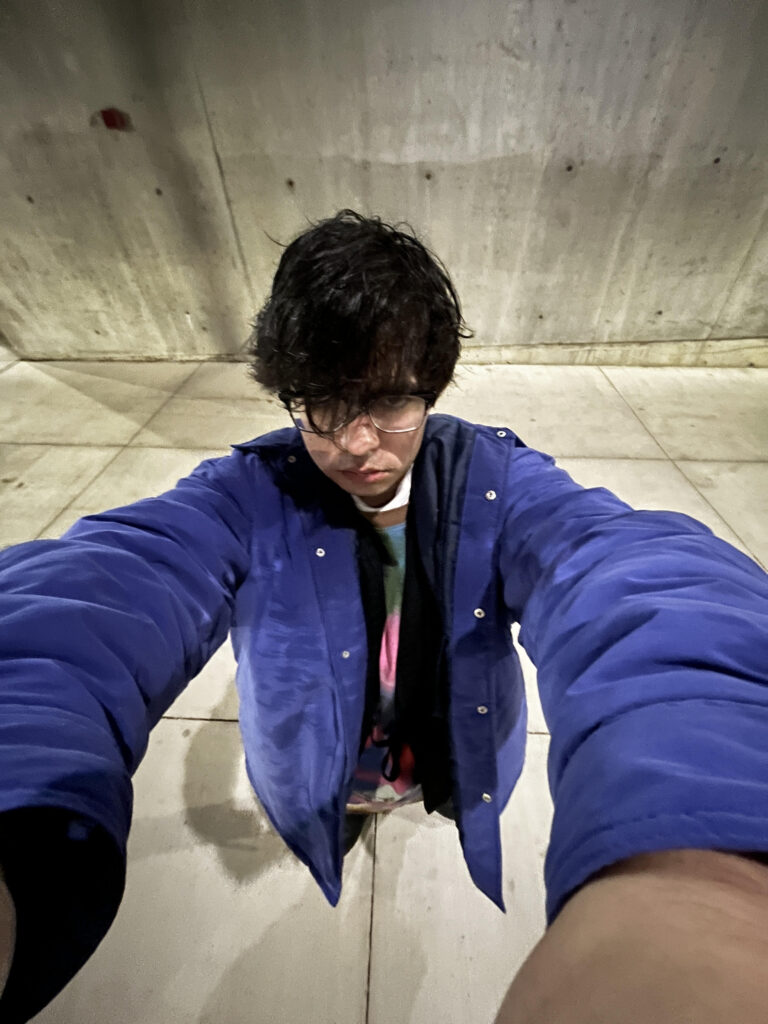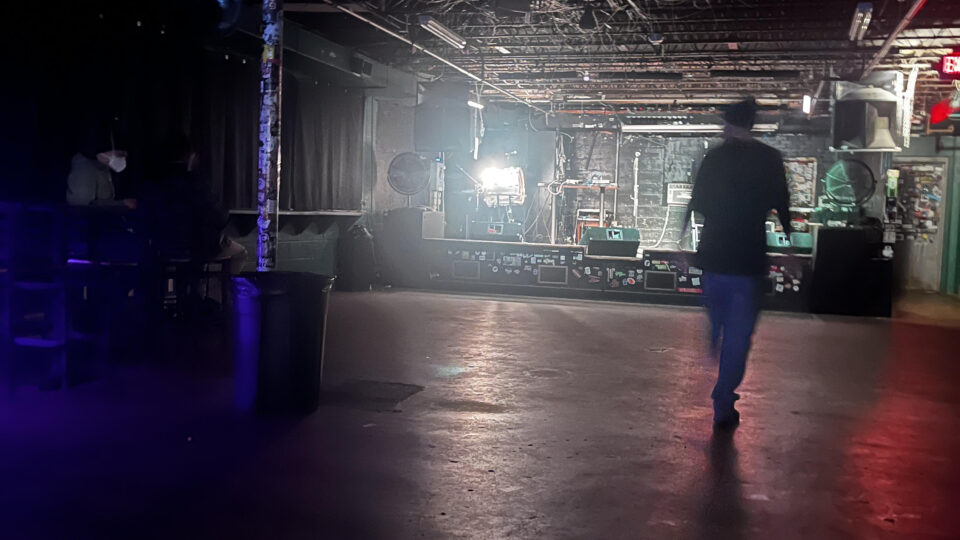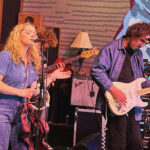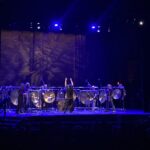I walked to the venue in pouring rain. I showed up to Gabe’s soaked. If I die from hypothermia, don’t ask any questions.
Upon my arrival, I heard a booming noise upstairs. The sound check was strong enough to make the stairs shake. It sounded like what you’d hear if you’re some Berghain hopeful, standing in line for like 5 hours, only to be rejected by the bouncer for looking like a poorly-dressed poser.
What you’re left with is the throbbing techno spilling out into the open air. The sound brings a foreboding feeling of exhaustion, a hint of the wild experience ahead. This aggressive thudding from above informed me that these performances wouldn’t be demure in sound or scope. There would be no lullabies, only night terrors.
The Feed Me Weird Things listening series, who sponsored the FEaST festival, brought three extreme voices together for one night: Masma Dream World, Joe Rainey, and Duma. It was a trio that celebrated otherness in music. If there’s one word to describe each act succinctly, it would be loud. Noise loud enough to give you tinnitus, to make your blood pulse faster.
The artists gave performances rooted in unique cultural practices that informed their abrasive, individualistic sounds. When the show started, I was curling up underneath an air dryer, trying not to die of temperature exposure. When I exited the bathroom, someone wrapped in a yellow shawl jumped off the stage, which was now soaked in red light. Surprise, I actually died and this is the obituary I wrote from hell.
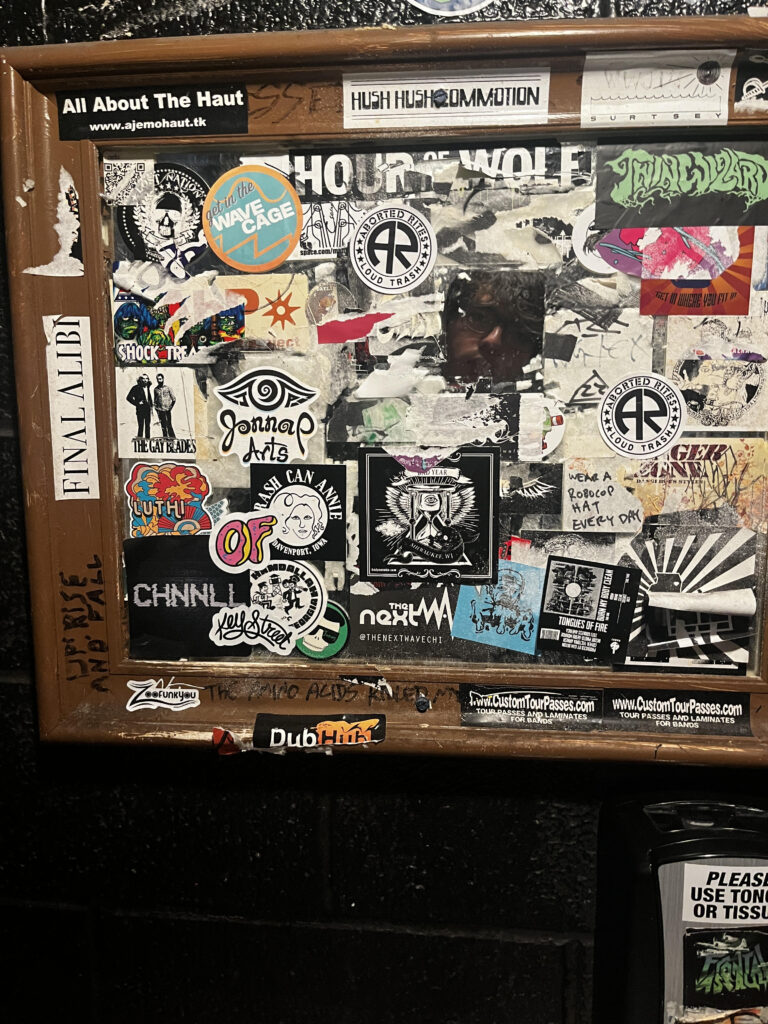
In what appeared to be a cleansing rite, the figure visited each corner of the room with lithe but warning movements. I soon learned that this figure was Masma Dream World.
Masma Dream World
Masma Dream World, or Devi Mambouka, resides in a unique place culturally as an African immigrant from the Bronx with ethnic roots in both Gabon and Singapore. Within this exchange of multi-ethnic identities, a new voice is found.
This voice is a variety of spiritual practices, such as Reiki, that culminate in a performance akin to a sacred ritual. Throughout their set, a spectacle comparable to Diamanda Galás emerged. Hissing, screaming, and singing worked against each other to channel a greater force into Iowa City. With ferocity in their eyes, the music shook the floor as they entered a state of what appeared to be religious ecstasy. Mambouka fell to the floor mid-performance, convulsing .
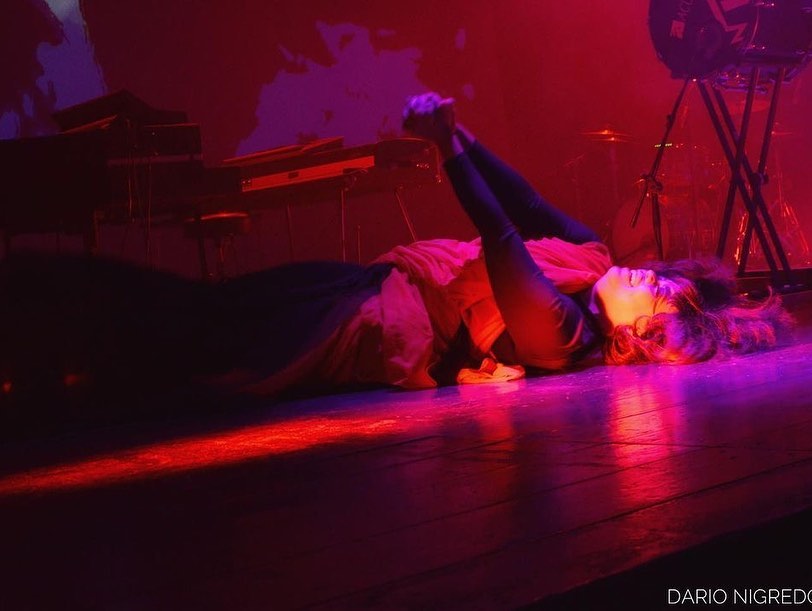
The emotionally dynamic set closed with a stellar finale. A drum was introduced, used, and attacked while a chanting backing track clashed with Mambouka’s own vocals. The space became anxious and enrapturing, like some ancient god’s wrath.
When the performance ended, Mambouka snapped back into normal consciousness like nothing had happened. The seemingly wild, uncoordinated performance now looked all the more impressive, with an extreme level of commitment to one’s art.
Mambouka explained afterwards that these means of practice and performance can help channel and find individual magic within themselves. This magic enables them to process pain and trauma in a meaningful way.
Through this showcase, Mambouka accomplishes that goal. Even though the music itself is austere and in some ways esoteric, Masma Dream World allows emotion to spring forth like light against shadow.
Joe Rainey
Imagine traditional, vocable, indigenous powwow music. Now imagine that powwow music set to rapid-fire, experimental electronic music. Enter Joe Rainey and his producer, Andrew Broder of Fog.
This avant-garde fusion of music, both of past and present, results in a sound that, truly, you have never heard before. Rainey’s vocals acted as sort of a battalion strike against the percussion and synths provided by Broder. A mix of repeating analog tape recordings of past powwows and vocal splice added an imposing history to the performance. It created a musical collage of both time and emotion, set at breakneck speed.
Such a singular combination of genre seems like an impenetrable listening experience. But Rainey came off as unpretentious in his red Vans. He used his performance as an interlocutor for the rich heritage of Native music combined with industrial, innovative production, while not losing his cultural footing.
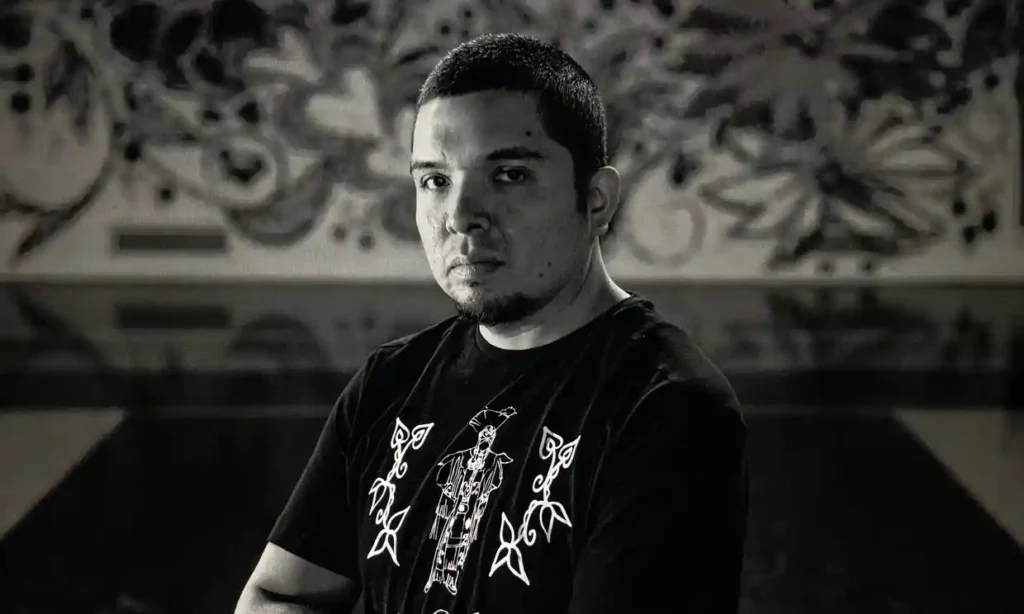
Rainey’s vocals were complemented by Broder, who moved wildly in an MF Doom tee, working with his electronic setup. He scratched his turntable and hit a synth board to Rainey’s ever-changing analog, while the lights flashed and flared blue and pink.
The audience seemed wildly intrigued but at the same time unsure of what was happening. I would be lying if I said I wasn’t thinking about how to respond to this music. Like do I move? Do I do a little dance? The first thought that came to my head was that one video of that random dude at a Merzbow concert brushing his teeth. However, to conceive of this music as something thought of, rather than felt, would be missing the point.
Once I let go of trying to process Rainey’s music by comparing it to a hegemonic notion of traditional music, his ethos of clashing time and culture slowly flourished in my mind. Things felt comprehensible, if only for a moment.
Rainey’s performance came as a vivid blur that left a distinct impression of his musical identity. With Broder’s help, Rainey radically reconfigured that identity into a transcendent sound like no other.
Duma
The night closed with Nairobi’s own Duma, a Kenyan noise-metal group that produces abrasive, grindcore music. They’re a duo composed of Martin Khanja (stage name Lord Spike Heart), and Sam Karugu. Both artists are willing to push music to its breaking point and trample on its shattered body.
The audience at Gabe’s that night was extremely varied, but skewed towards an older crowd. Gauging the crowd’s reaction was difficult. They were mostly taken aback, or intrigued, or a combination of both. The handler’s reactions where hilarious; imagine total annoyance and confusion.
Even though the audience, with their craft beers in hand, could get past the spiritual neurosis of the first two acts, Duma was about to throw them for a massive loop. The night was full of experimental, abrasive music, but somehow Duma immediately established itself as the loudest, like a predator claiming its territory.
The duo began their set with Karugu in a white balaclava and Khanja in devil-hooded leather jacket. The stage lights became epileptic with rhythmic ramming of what could be conga drums. Sound filled the room like deafening machine guns firing, with shrills of guitar tearing through the speakers.
Frenetic energy was all around, exemplified by the headbangers who came to the front and started moving with Khanja as he screamed and sang their hellish songs. They filled the stage with their presence, and Khanja’s movements were straight out of a horror movie, carnal and charged, slow and fast. Duma acted as the harbingers of chaos while the pulsating lights created a hallucinatory atmosphere. Maybe Duma is the 5th horseman of the apocalypse.
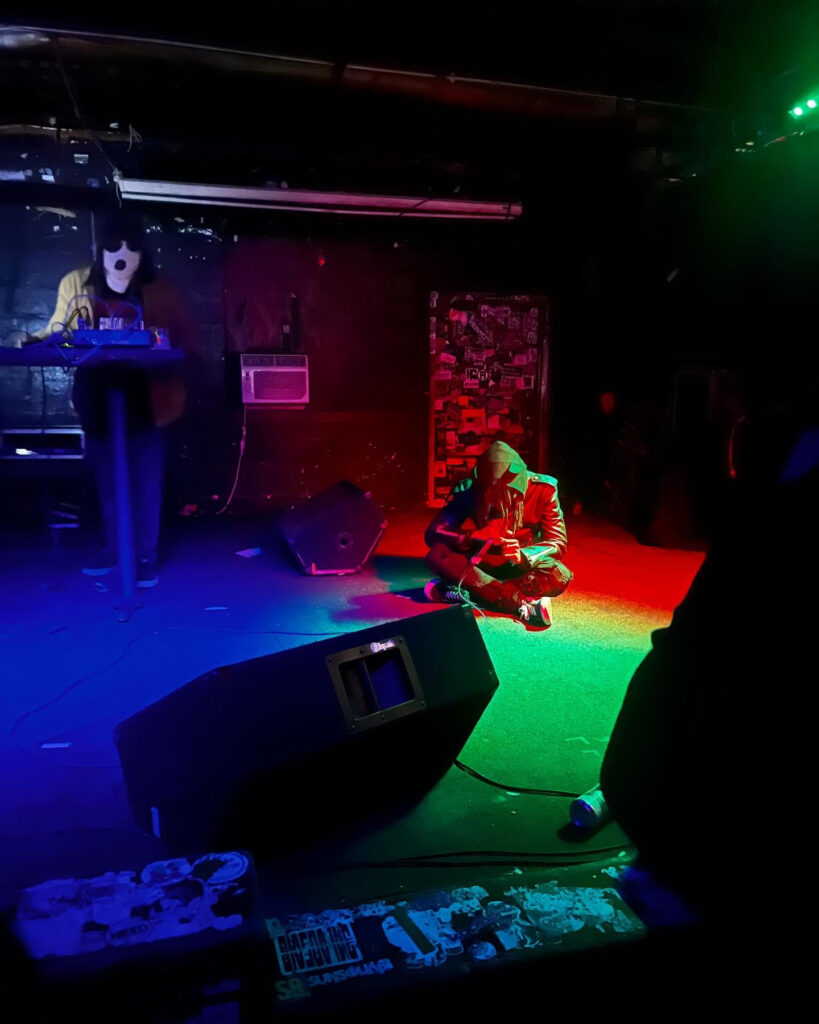
I remember turning around and seeing an uncomfortable man’s face. He looked twisted, as trying to fight against Duma’s sonic path of destruction in that moment was like fighting madness itself. My head spun and my body moved unintentionally, trying to find its way in this new, distorted world. I could only clench my fist and beat it against the nightmarish entity inhabiting the stage. A drunken man smelling of weed-gummies shouted and threw his body back and forth to the music.
The set stopped after a ravaging 30-40 minutes. It took a while to readjust to reality, like being pulled out of a raging vortex. After congratulating Duma, I managed to get a quick word in.
To paraphrase, Duma spoke of the incredible work that this festival seeks to promote, by letting performers from all around the globe showcase their work. After crossing oceans, mountains, and too many farms, they were ecstatic to play Iowa a second time: the home of Slipknot. Duma was grateful to showcase the emerging creativity coming from the Kenyan metal scene right now.
That’s what I gained through this show and festival: a diverse roster of artists coming together to showcase their unique talents and perspectives, broadening both cultural and sonic landscapes. I ended the night by listening to some of each acts’ songs while walking home, eating pizza in the freezing rain.
